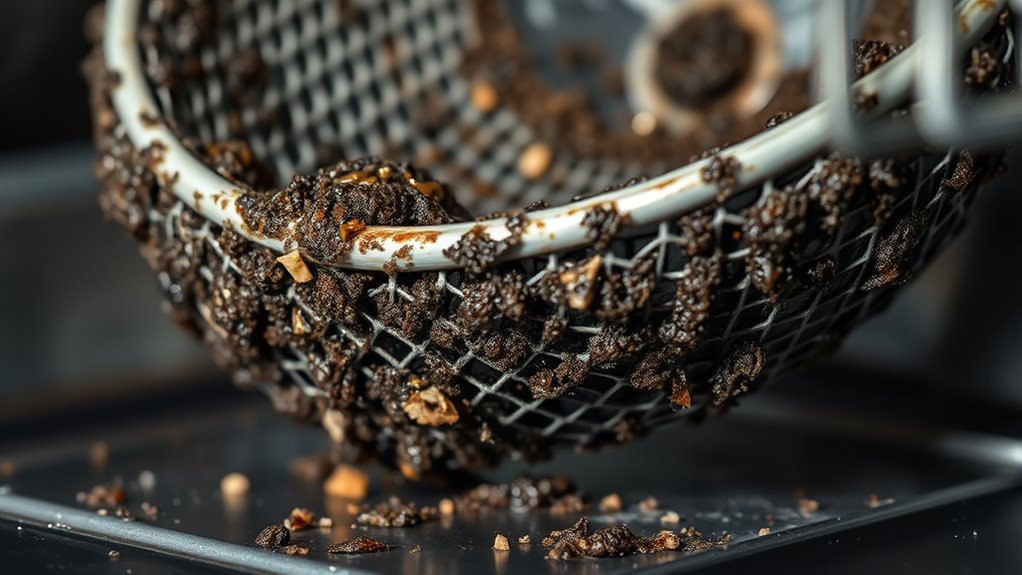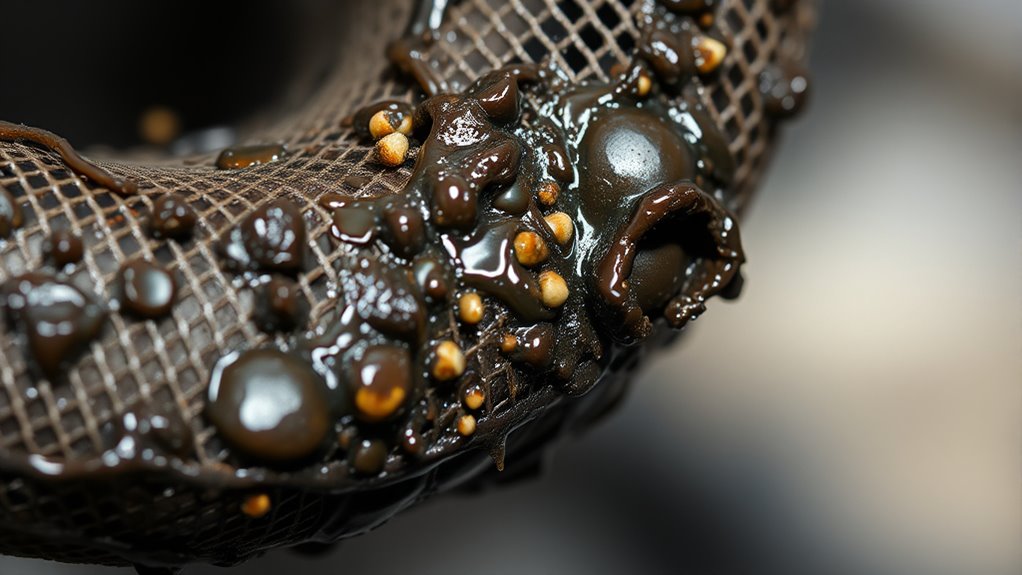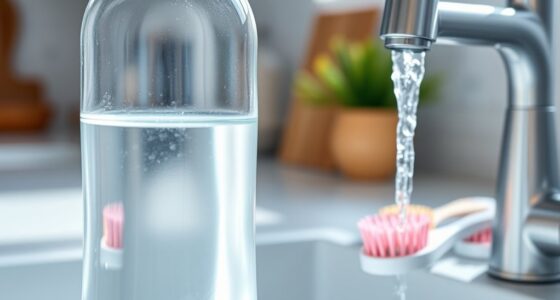To keep your dishwasher odor-free, regularly clean the filter to prevent gunk buildup. Remove the filter, then use warm water and a soft brush to dislodge trapped debris, grease, and food particles. Ensuring the filter is clean helps water circulate properly, reducing odors and improving cleaning performance. Regular maintenance also prevents bacteria growth and foul smells. Keep going to find out more tips on maintaining a fresh, efficient dishwasher every cycle.
Key Takeaways
- Regularly remove and scrub the filter with warm water and a soft brush to prevent gunk buildup.
- Clear debris, food particles, and grease to maintain proper water flow and odor control.
- Use dishwasher-safe cleaning agents to break down stubborn grime and eliminate foul smells.
- Wipe door seals and interior walls to reduce mold and bacteria that cause odors.
- Consistent filter maintenance ensures cleaner dishes, fresher cycles, and extends dishwasher lifespan.

If you notice your dishes aren’t coming out as clean as they used to, dishwasher filter gunk might be the culprit. Over time, debris, food particles, and grease can accumulate in the filter, hindering water flow and reducing cleaning efficiency. Regular filter maintenance is essential not only to keep your dishes sparkling but also to prevent unpleasant odors from developing. When the filter isn’t cleaned regularly, trapped grime can become a breeding ground for bacteria and mold, which produce that foul smell lingering in your dishwasher. To avoid this, make it a habit to inspect and clean your filter at least once a month. Removing and rinsing the filter with warm water and a soft brush helps dislodge stubborn gunk, ensuring your dishwasher functions *effectively*. Incorporating Free Floating mechanisms can help prevent debris from settling and accumulating in your dishwasher over time.
Proper filter maintenance directly impacts odor prevention. When the filter is clogged, stagnant water can sit in the bottom of the dishwasher, creating a damp environment that promotes bacteria growth. This results in a persistent, sour smell that’s tough to eliminate if ignored. By keeping the filter clean, you allow water to circulate freely, flushing away food remnants and preventing buildup. This simple step *considerably* cuts down on odors and contributes to fresher, cleaner-smelling cycles. Additionally, avoiding the buildup of gunk means your dishwasher doesn’t have to work as hard, which can extend its lifespan and improve energy efficiency.
Another way to support odor prevention is to regularly run your dishwasher with a cleaning agent designed to break down grease and grime. These products help clear out any residual gunk that might be hiding in the filter or spray arms. Remember, a clean dishwasher is a more hygienic one. Besides filter cleaning, wiping down the door seals and interior walls also prevents mold and mildew, which can cause odor issues. When you combine consistent filter maintenance with proper cleaning routines, you’ll notice your dishwasher performing better and smelling fresher after each cycle.
Incorporating these habits into your routine doesn’t take much time but yields big results. Not only will your dishes come out cleaner, but you’ll also avoid the hassle and embarrassment of foul odors. Keeping the filter clear of gunk is a straightforward, effective way to maintain your dishwasher’s performance and *guarantee* it continues to serve you well. Make filter maintenance a priority, and you’ll enjoy odor-free cycles and spotless results every time.
Frequently Asked Questions
How Often Should I Replace My Dishwasher Filter?
You should replace your dishwasher filter every 3 to 6 months, depending on your usage and water quality. Regular filter replacement is essential for proper maintenance and to prevent odors. Follow your dishwasher’s maintenance schedule to keep it running efficiently. If you notice persistent odors or clogs, consider replacing the filter sooner. Staying on top of filter replacement ensures clean dishes and a fresh-smelling appliance.
Can Dishwasher Filter Gunk Cause My Dishes to Smell?
Yes, dishwasher filter gunk can cause your dishes to smell. When you neglect dishwasher maintenance, debris and mold build up in the filter, leading to unpleasant odors. Regularly cleaning the filter helps prevent these smells and keeps your dishwasher running efficiently. For odor prevention, make it a habit to check and clean your filter weekly. This simple step ensures your dishes come out fresh and your machine stays odor-free.
Are There Natural Methods to Clean Dishwasher Gunk?
Yes, you can use natural cleaning and homemade remedies to clean dishwasher gunk. Try running a cycle with white vinegar and baking soda to break down buildup and eliminate odors. You can also scrub the filter with a mixture of baking soda and water or use lemon juice for a fresh scent. These natural methods are effective, eco-friendly, and safe for your dishwasher.
What Are the Signs of a Clogged Dishwasher Filter?
Imagine you’re in a vintage film scene—your dishwasher isn’t performing well. You notice poor cleaning, unpleasant smells, or standing water, signaling a clogged filter. During filter inspection, debris accumulation is evident, and water may drain slowly. These signs indicate it’s time to clean your filter. Regularly checking for debris buildup helps prevent clogs, ensuring your dishwasher runs efficiently without odors or leftover grime.
Does Hard Water Increase Filter Gunk Buildup?
Yes, hard water increases filter gunk buildup. Water hardness causes mineral deposits, like calcium and magnesium, to accumulate in your dishwasher filter. These deposits stick to the filter over time, making it harder for water to flow and leading to gunk buildup. To prevent this, regularly clean your filter and consider installing a water softener to reduce mineral deposits from hard water, helping your dishwasher run smoothly and stay odor-free.
Conclusion
Cleaning your dishwasher filter might seem like a small task, but it makes a big difference. While it keeps odors at bay, it also restores your machine’s efficiency. Think of it as clearing out not just gunk, but also the barriers to fresh, spotless dishes. Sometimes, the tiniest act—like cleaning a filter—can transform your entire routine. Don’t overlook this simple step; it’s the key to a cleaner, more invigorating kitchen experience.









